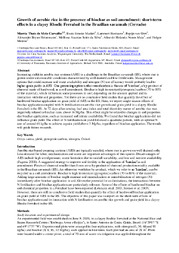Growth of aerobic rice in the presence of biochar as soil amendment: short-term effects in a clayey Rhodic Ferralsol in the Brazilian savanna (Cerrado).
Growth of aerobic rice in the presence of biochar as soil amendment: short-term effects in a clayey Rhodic Ferralsol in the Brazilian savanna (Cerrado).
Author(s): CARVALHO, M. T. de M.; MADARI, B. E.; BASTIAANS, L.; VAN OORT, P.; HEINEMANN, A. B.; SILVA, M. A. S. da; MAIA, A. de H. N.; MEINKE, H.
Summary: Abstract: Increasing yields in aerobic rice systems (ARS) is a challenge in the Brazilian savannah (BS), where rice is grown under unfavourable conditions characterised by well drained and low fertile soils. Management options that could increase soil water availability and nitrogen (N) use efficiency would probably lead to higher grain yields in ARS. One promising option under consideration is the use of ?biochar?, a by-product of charcoal made of hardwood, as a soil amendment. Biochar is high in resistant (pyrogenic) carbon (70 to 80% of the material), which influences some processes in soil, depending on the amount applied and its interaction with the soil properties. Yet there are no conclusive field studies that quantify the effect of hardwood biochar application on grain yield of ARS in the BS. Here, we report single season effects of biochar application coupled with N fertilisation on aerobic rice growth and grain yield in a clayey Rhodic Ferralsol in the BS. At 72 days after sowing, leaf area index and total shoot dry matter of aerobic rice was negatively related to biochar rates above 16 Mg/ha. This effect might be related to changes in soil properties due biochar application, such as increased soil nitrate availability.We found that biochar applications did not influence grain yield. The effect of N fertilisation on yield followed a quadratic pattern, with an optimal N rate of around 46 kg/ha to achieve a grain yield above 3 Mg/ha, regardless of biochar application. The trends will guide future research.
Publication year: 2012
Types of publication: Paper in annals and proceedings
Unit: Embrapa Environment
Keywords: Ferralsol, Oryza Sativa, Pinthosol, Pyrogenic C, Soil amendment, char
Observation
Some of Embrapa's publications are published as ePub files. To read them, use or download one of the following free software options to your computer or mobile device. Android: Google Play Books; IOS: iBooks; Windows and Linux: Calibre.
Access other publications
Access the Agricultural Research Database (BDPA) to consult Embrapa's full library collection and records.
Visit Embrapa Bookstore to purchase books and other publications sold by Embrapa.

